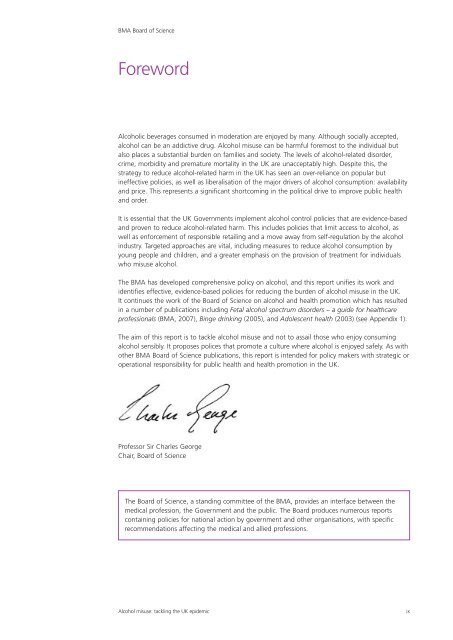Alcohol misuse: tackling the UK epidemic - London
Alcohol misuse: tackling the UK epidemic - London
Alcohol misuse: tackling the UK epidemic - London
Create successful ePaper yourself
Turn your PDF publications into a flip-book with our unique Google optimized e-Paper software.
BMA Board of Science<br />
Foreword<br />
<strong>Alcohol</strong>ic beverages consumed in moderation are enjoyed by many. Although socially accepted,<br />
alcohol can be an addictive drug. <strong>Alcohol</strong> <strong>misuse</strong> can be harmful foremost to <strong>the</strong> individual but<br />
also places a substantial burden on families and society. The levels of alcohol-related disorder,<br />
crime, morbidity and premature mortality in <strong>the</strong> <strong>UK</strong> are unacceptably high. Despite this, <strong>the</strong><br />
strategy to reduce alcohol-related harm in <strong>the</strong> <strong>UK</strong> has seen an over-reliance on popular but<br />
ineffective policies, as well as liberalisation of <strong>the</strong> major drivers of alcohol consumption: availability<br />
and price. This represents a significant shortcoming in <strong>the</strong> political drive to improve public health<br />
and order.<br />
It is essential that <strong>the</strong> <strong>UK</strong> Governments implement alcohol control policies that are evidence-based<br />
and proven to reduce alcohol-related harm. This includes policies that limit access to alcohol, as<br />
well as enforcement of responsible retailing and a move away from self-regulation by <strong>the</strong> alcohol<br />
industry. Targeted approaches are vital, including measures to reduce alcohol consumption by<br />
young people and children, and a greater emphasis on <strong>the</strong> provision of treatment for individuals<br />
who <strong>misuse</strong> alcohol.<br />
The BMA has developed comprehensive policy on alcohol, and this report unifies its work and<br />
identifies effective, evidence-based policies for reducing <strong>the</strong> burden of alcohol <strong>misuse</strong> in <strong>the</strong> <strong>UK</strong>.<br />
It continues <strong>the</strong> work of <strong>the</strong> Board of Science on alcohol and health promotion which has resulted<br />
in a number of publications including Fetal alcohol spectrum disorders – a guide for healthcare<br />
professionals (BMA, 2007), Binge drinking (2005), and Adolescent health (2003) (see Appendix 1).<br />
The aim of this report is to tackle alcohol <strong>misuse</strong> and not to assail those who enjoy consuming<br />
alcohol sensibly. It proposes polices that promote a culture where alcohol is enjoyed safely. As with<br />
o<strong>the</strong>r BMA Board of Science publications, this report is intended for policy makers with strategic or<br />
operational responsibility for public health and health promotion in <strong>the</strong> <strong>UK</strong>.<br />
Professor Sir Charles George<br />
Chair, Board of Science<br />
The Board of Science, a standing committee of <strong>the</strong> BMA, provides an interface between <strong>the</strong><br />
medical profession, <strong>the</strong> Government and <strong>the</strong> public. The Board produces numerous reports<br />
containing policies for national action by government and o<strong>the</strong>r organisations, with specific<br />
recommendations affecting <strong>the</strong> medical and allied professions.<br />
<strong>Alcohol</strong> <strong>misuse</strong>: <strong>tackling</strong> <strong>the</strong> <strong>UK</strong> <strong>epidemic</strong> ix
















